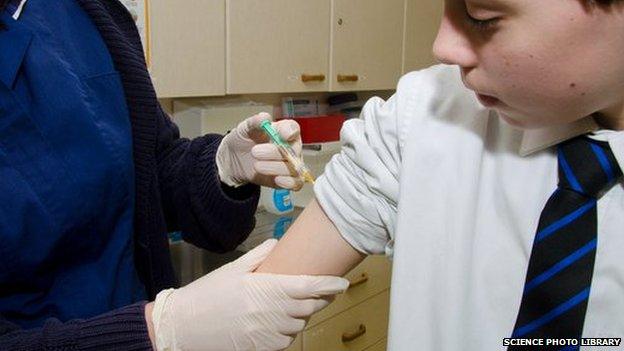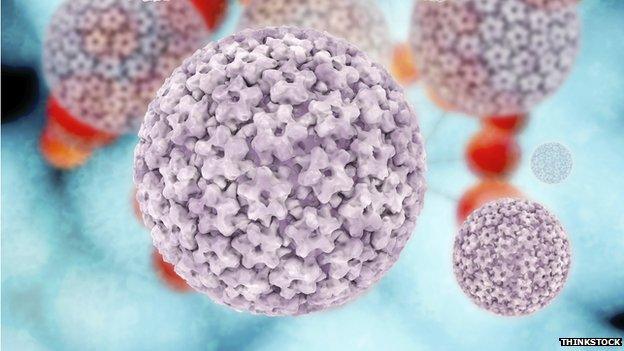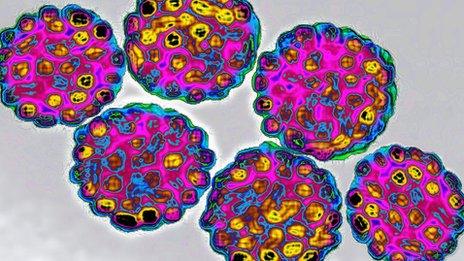Call to offer HPV vaccine to boys
- Published

There is no national HPV vaccination programme for boys
Scientific experts are meeting on Monday to discuss whether boys as well as girls should be offered the HPV jab.
It comes amid pressure to extend vaccination to all adolescent boys in the UK, in line with other countries.
The committee is expected to focus initially on whether to offer the vaccine to men who have sex with men, who may be at higher risk.
But a coalition of health experts and campaigners say vaccinating all boys aged 12 to 13 would save lives.
HPV (human papillomavirus) infections cause 5% of all cancers worldwide, and rates are rising. The virus causes most cases of cervical cancer, and some cancers in other parts of the body, including the throat, anus and penis.
The UK's HPV vaccination programme reaches over 80% of girls, but coverage rates are lower in some communities.
Peter Baker, Campaign Director of HPVAction.org, external, said it was blatantly unfair that women were protected from cancers and other diseases caused by HPV infection while men were not.
"Men will continue to die from HPV-related diseases unless the government acts to extend the national vaccination programme to all adolescent boys," he said.
"This would only cost about £20-£22m a year and, in the long run, save the money spent by the NHS on treatment as well as reducing human suffering.
"If parents knew that their sons as well as their daughters could be protected from the virus that causes 5% of all cancers, then I'm sure most would also agree."
Debate over costs
The Royal Society for Public Health, external is among a number of health bodies calling for all boys aged 12 to 13 to be offered the vaccine.
It is thought that vaccinating girls will reduce the number of men getting HPV because infection occurs through sexual contact.
But Shirley Cramer, chief executive of the Royal Society for Public Health, said vaccinating all boys would help to protect girls from cancer, as well as protecting men who have sex with men.
"Since introducing the HPV vaccination for girls in 2008, we have seen incredible uptake and sharp declines in HPV infection rates but we must ensure that boys, who don't profit from herd immunity, external can also reap these benefits," she said.
"Herd immunity only works in later life for males who are sexually active with females who have been vaccinated - it won't work for men who are sexually active in countries where the vaccine isn't available, those who have sex with men, or those who have sex with the estimated 15% of girls who haven't had the vaccine."
Earlier this month, a group of MPs called for all adolescent boys to be offered the vaccine. They said more than 2,000 cases of cancer in men each year in the UK were caused by HPV.
"The long-term savings in treatment and care of men with HPV-related diseases would considerably outweigh the extra cost (about £20 million a year) of extending the programme," they wrote in a letter to the Times.
It was signed by the heads of the All-Party Parliamentary Groups on Cancer, Dentistry, Sexual and Reproductive Health, Men's Health and HIV and Aids.
Global programmes
Vaccination programmes offering protection for girls against HPV have been introduced in many countries.
Some countries - including Australia, the US, Austria and part of Canada - have also extended the jab to boys.
Monday's meeting involves HPV experts from the government's Joint Committee on Vaccination and Immunisation, external.
Their task is to investigate whether to extend the vaccine to boys, or men who have sex with men, or both.
Any decision made will be passed to the main committee for consideration in October.
Public Health England said the UK HPV programme had achieved very high coverage for girls.
"Extending vaccinating to boys in the UK, therefore, is likely to provide relatively few additional benefits, and under current assessment conditions and costs may not be the best use of health care resources," said Dr Kate Soldan, head of HPV surveillance at the health body.
"Some males, particularly men who have sex with men, are likely to gain far less protection from HPV through herd immunity from the vaccination of females."
Further studies were under way to inform the potential design and implementation of a vaccination policy targeted at men who have sex with men, she added.


HPV
There are more than 100 different types of human papillomavirus (HPV)
A number of HPV types are passed on from one person to another through sexual contact
Some types of HPV can increase the risk of developing cervical cancer
Around 3,100 women are diagnosed with this type of cancer every year in the UK.
- Published21 July 2013
